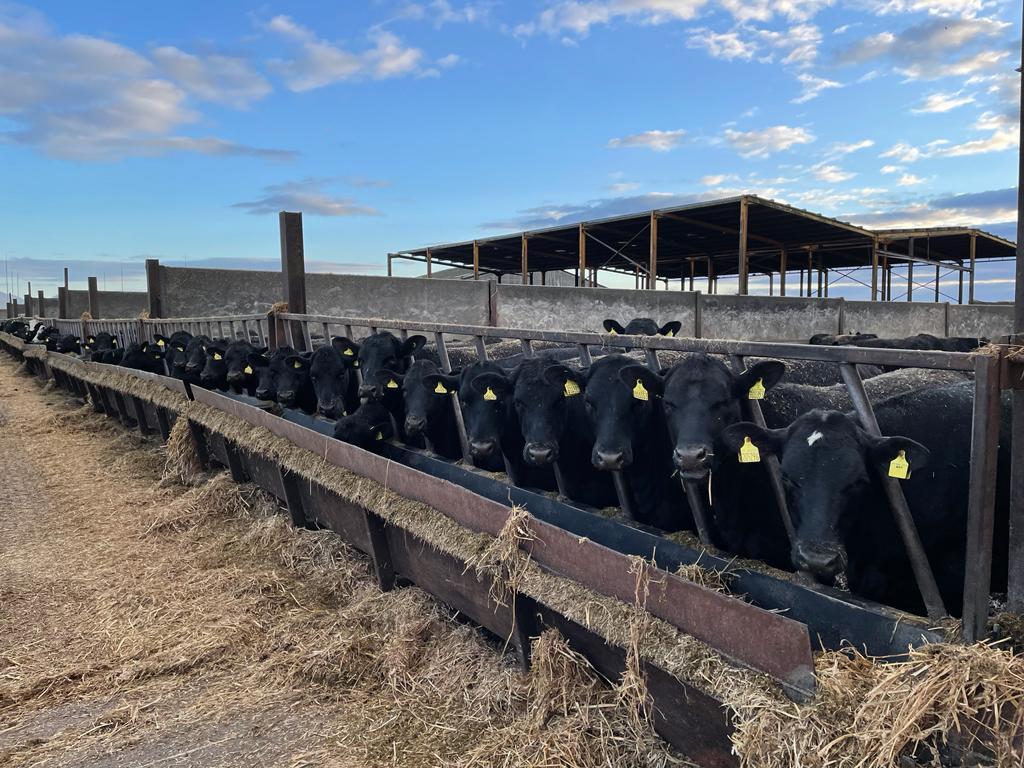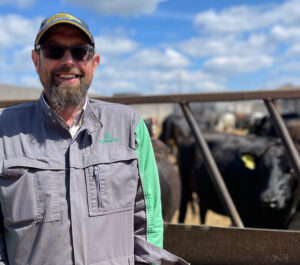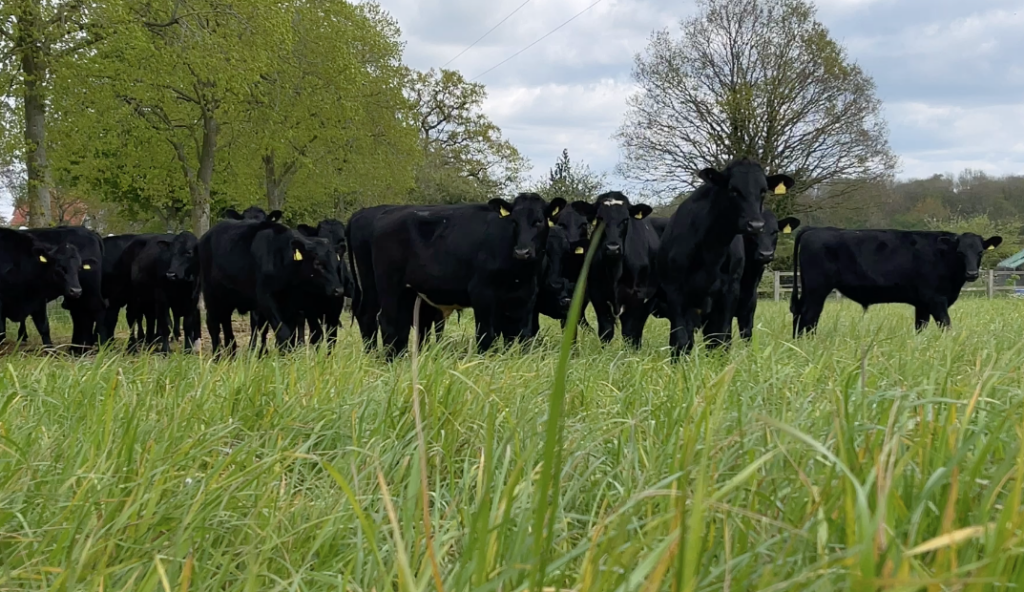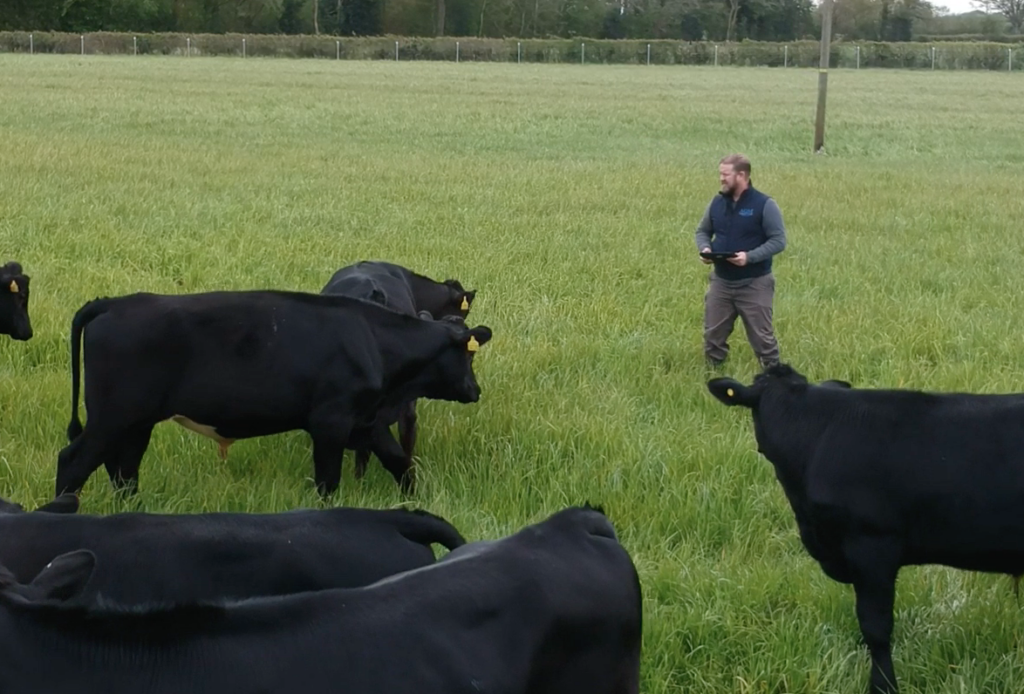Trial farms say new service could ease current pressures on farm businesses
26th May 2022
Anglia Quality Meat (AQM) is launching a timely new service for farmers in June, offering a simple way to capture and store all farm data on the cloud, with expert support from AQM to highlight inefficiencies and help livestock reach their potential. We caught up with two trial farms who say AQM+ brought a variety of benefits to their businesses.

Somerset Farm – a beef finishing unit in Cambridgeshire comprising 1,500 cattle – began trialling the new system last year after deciding to switch to EID tags in 2020 to improve identification of animals.
What is AQM+?
AQM+ was created in partnership with AgriWebb and provides access to all farm data on your phone or computer, with access for multiple users and devices, allowing better integration with vets, nutrition companies and the supply chain. It’s cloud-based to avoid losing records and AQM helps to manage livestock on the system and monitor their performance. Kill and financial data can be uploaded into the system directly for more accurate cost of production figures, kill out % and performance for stock sold through AQM. Better forecasting of stock also enables management of cashflow and efficient marketing of stock.
Key to the concept – and what makes it unique – is that farmers are not required to analyse the data, explains James Doel of AQM. This support will instead be offered by AQM’s experienced field staff, who can look at real time data being captured on farm and using specialised data modelling and expertise to advise on helping livestock to reach its potential.
It also allows AQM to communicate better with the supply chain and tailor the best time to sell to get the best price.
To explore the scalability of the system, AQM carried out trials with two cattle farms – one a Cambridgeshire-based beef finishing unit with 1,500 cattle and the other a Suffolk arable farm that has just got back into livestock with 25 Aberdeen Angus X weaned calves. AQM hopes to carry out further trials on sheep farms later in the year.
In the current climate, which has seen British farmers face an unprecedented cocktail of challenges, the service could not have come at a better time, the trial farms agree.

Robbie Moore, who runs a beef finishing unit in Cambridgeshire, said the key benefits of the system are making the data easily available to AQM, vets and nutritionists, and the ability to forecast sales.
Somerset farm, Cambridgeshire
Cambridgeshire farmer Robbie Moore runs Somerset Farm – a beef finishing unit comprising 1,500 cattle, with up to 12 different breeds and an annual turnover of 9–10 months last year. The farm feeds a heavy forage diet to fatten cattle to around 600-620 liveweight, after which they are sold to the abattoir by AQM.
They began trialling the system in January 2021 after deciding to switch to EID tags in 2020 to improve identification of animals. They had tried one system already but although it was very good it wasn’t cloud-based, so when AQM took on the marketing in August 2020, the process of providing AQM with access to the data was very clunky and difficult, Robbie says. With Covid restrictions at the time it also meant that face-to-face interaction between AQM and the farm wasn’t always possible either.
A key benefit of the system, Robbie says, is the ability to make the farm’s data easily accessible to not only AQM but also vets and nutritionists. If there’s a problem, the relevant person can get straight onto the system and pull up the animal’s data.
Another key benefit of the system is it also allows AQM to forecast the farm’s sales. It sells at least one group of 40 cattle every week which is a huge income for the farm, but AQM can forecast if they will need to miss a week or sell two groups in one week, so Robbie can warn his finance team – benefitting cash flow. While selling isn’t much of a problem at the moment due to high demand and prices, in a different time the system could also provide information on the best time to sell to market with the most profit, Robbie noted.
Since using AQM+ the farm has seen a 9% increase in deadweight for the 2,000 cattle sent that year.
Asked whether the farm will subscribe to the system after the trial Robbie said: “100% we’ll sign up to it because we want to expand further and bring in nutrition and feeder wagons. At the moment we run a separate programme so we want to integrate that with AQM+, then we can use the information we’re getting on daily liveweight gain and feed in the actual ration they’re receiving and link it into profitability.”
He added: “Most farmers don’t mind spending money on a product if it works and this will give you very quick visibility that what you’re doing is working. […] Input costs are sky high but at the moment the end price is going up at the same time. But there will be a time when one end or the other will slow down. We’ve got to be ready to react to that and the more information coming in the easier it will be,” he concluded.
Robbie will be joining AQM at the Suffolk and Norfolk Shows in May and June to talk to farmers about AQM+.

When they decided to get back into livestock last year as part of a regen ag focus, Suffolk arable enterprise Bishops Farm got in touch with AQM and purchased 25 Aberdeen Angus crosses. They began using AQM+ as they wanted to monitor growth rates closely and reduce input costs.
Bishops Farm, Suffolk
Suffolk-based Bishops Farm wanted to source weaned calves last autumn and got in touch with AQM, who they had worked with in the 1980s and was surprised to find Richard Doel still worked there. Farmer Mike Morley says they wanted to do a grass herbal ley feeding system and didn’t want to feed a lot of barley to finish the cattle, so they decided to go for 25 Aberdeen Angus crosses – but this number will grow with the help of the AQM+ system, he said. As Mike wanted to monitor growth rates closely and reduce input costs, they signed up to trial AQM+ last autumn and purchased load bars and a weigh head. Cattle are weighed every six weeks during winter and again mid-season. As they are now out at grass they are weighed every three months.
Commenting on the progress so far Mike said the system has been “brilliant”, with the 90ha farm seeing a good record of growth rates, and cattle are performing very well.
They were fed a grass-based system feeding haylage from Westerwold ryegrass last year, with concentrates being fed at 1% of bodyweight. Having accurate weights means the feed could be adjusted over winter, and with input costs being so high, you don’t want to overfeed them or for the calves to start to go to fat. Mike lead-fed the calves so if they were 300kg they were fed for 350kg, which provided gains of 1–1.5kg a day through winter.
Partner in the farming business, Tom Rouse, said the system is easy to use and can be run off an iPad, with the weigh head bluetoothing to the iPad. “By tapping a few buttons, we get the live weights as cattle run through the crush, so all are instantly recorded and it syncs up to the cloud so we can process it when we’re back in the office and have more time.”
Tom has been an agronomist for around 10 years and notes that while agriculture is moving rapidly towards data collection, many people are not doing very much with the data. Additionally, he noted that when you’re in the middle of a job such as weighing cattle, it’s important that the data is reliable so you can access it later. The farm also wormed the calves when they arrived and this information was recorded straight into the system at the same time as weighing.
The system has offered benefits for compliance and easing the pressures around compliance, Tom added.
“As far as assurance is concerned, it’s all in there ready to go – we’re not going to have to fumble around leading up to an inspection. There are 100 jobs to do on farm and we’re generating data for all of it, so the last thing you want is to have to work out where it all is for your inspections and assurance. AQM+ is great because I’m confident all the information is there for when the inspector shows up.”
Another benefit of the system, Mike explains, is they can use the data to make more informed decisions when choosing the best sires for the weaned calves they are purchasing.
Overall, Mike says he is “thrilled” with the system and added that the support from Richard and James at AQM has been “phenomenal”, so they will be subscribing to AQM+ going forward and ordering more weaned calves in the next month.
In the future, the system will also be important for marketing, Mike said. As cattle mature and start to lay down fat, meaning their growth rates slow, AQM+ offers a tool to highlight more effectively when cattle need to go to slaughter – avoiding pumping concentrates into cattle when their growth rates are dropping.
Commenting on the farm’s regen ag focus, Tom says that from an agronomist’s point of view, those of his clients that have kept livestock or at the very least maintained muck input from a neighbouring livestock farmer, have more resilient crops that are more tolerant of abiotic or climatic pressures. For Bishop’s Farm, the fields that have gone into herbal ley should have no artificial inputs for the next five years, offering a real opportunity for them to boost soil health.
With input costs so high, the farm has been growing peas and beans for the past 4-5 years to reduce fertiliser use, as well as using Anglian Water sewage sludge to put organic matter into the soil – now coupled with the livestock and manure to improve soil health. They also grow winter barley, winter wheat, spring barley, Westerwold ryegrass for making haylage and sugar beet.
Mike will be at the Suffolk Show with AQM and encouraged cattle and sheep farmers to discuss the benefits of the system.
Further information
There will be an annual subscription for AQM+, including the software, support, subscription and updates. The first year will cost £600 – which includes a member of the team visiting the farm to get the user on the system and sit with them to make sure they can use it. The system will also be tailored to capture the data the farm wants to achieve. After the first year it will be £400/year. There will also be an animal management charge made once the animal is sold.
AQM+ is being officially launched at the Suffolk Show (31st May – 1st June) and Norfolk Show (29–30th June). AQM will be doing a launch offer at both shows with money off the first year, and will hold two demos a day which you can register.

